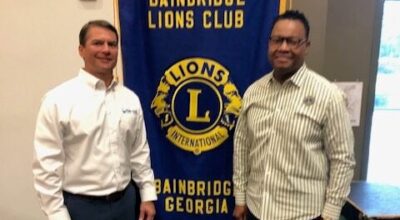Welch: Taxpayers not receiving services they pay for
Published 2:40 pm Wednesday, August 6, 2014
At Tuesday night’s Bainbridge City Council meeting, the council heard a presentation regarding the double taxation of Bainbridge’s property taxpayers.
The presentation, prepared by Buddy Welch, an attorney with Smith Welch Webb & White based in McDonough, Ga., and his colleague Michael Brown, revealed that there are multiple services that city taxpayers do not receive from Decatur County despite paying county property taxes.
“What that simply means is that the county is providing a service to the unincorporated area, but they are not providing that service to the incorporated area. The city taxpayers, the property taxpayers, are paying for a cost of a service they do not receive,” Welch said.
The council voted to develop a committee to present the Decatur County Commissioners with Welch and Brown’s findings. That committee will consist of Mayor Edward Reynolds, City Manager Chris Hobby, local attorney David Kendrick, Welch and Brown.
‘Double taxation’
According to Welch, Brown and Kendrick’s findings, city property taxpayers are facing “double taxation” on the animal control, fire protection, code enforcement, land use and planning and zoning services.
This means that city residents who pay property taxes are paying county taxes for services they do not receive from Decatur County.
“The service delivery strategy law was put into effect to accomplish several purposes. One of the main purposes was to create or to prevent competition between public entities in providing services,” Welch said. “It’s also to provide tax equity.”
Welch said that tax equity will not necessarily mean the county will write the city a check, providing more money, but will result in a reduction in county property taxes, an amount Welch estimates to be about two mils.
“What it really means is that the taxpayers in the city will not be paying for a service that they do not receive, so they should see a rollback or reduction in their county property tax. We think it’s an excess of two mils.”
O.C.G.A Section 36-70-23, the Service Delivery Act, reads that all local government services must be identified, and the governments must create “an assignment of which local government or authority … will provide each service, the geographic areas of the county in which such services are to be provided, and a description of any services to be provided by any local government to any geographic area outside its geographical boundaries. In the event two or more local governments within the county are assigned responsibility for providing identical services within the same geographic area, the strategy shall include an explanation of such arrangement….”
Intergovernmental contracts
Other points of discussion Welch wants to address with the Decatur County Commission are prisoner use, garbage collection, parks and recreation, police services, public utilities and road maintenance.
“We do have recommendations that (the city and county) enter into intergovernmental agreements that we think can save a significant amount of money for all of the taxpayers of this county,” Welch said. “We think that they need to be handled by way of contracts.”
Welch recommends the city attempt to enter agreements with the county to establish which entity provide which service and to insure citizens pay for services they receive and not pay excess for those they don’t receive.
“Parks and recreation is really a significant issue,” Welch said. “It’s serving the entire community. The problem is the unincorporated area consists of over 50 percent of the population of this county, but they are not contributing any money toward the operation of the recreational facilities or parks facilities that you maintain the service of for everyone.”
Welch said that the maintenance of roads is also an issue because the county is not contributing money to the maintenance of city streets or the county roads that lead into the city.
Public utilities is a point of interest because Welch believes that the city has the ability to provide water and sewer service county-wide.
“The county has its own water and sewer system. It is an enterprise fund, but they are losing significant money on that fund every year,” Welch said. “It appears that they are using some of the monies that come from the landfill fund to compensate for the loss of it, but there is still an additional loss that they are taxing the city taxpayers for that you don’t receive.”
Decatur County has multiple enterprise funds, or funds that are dedicated for a specific use. The county landfill and county utilities are each separate enterprise funds.
“The tax levy should not be made until you, first of all, determine what the cost of the service is, apply any income that the service generates toward the cost of that service, and then you have your tax for the balance,” Welch said. “The idea of just dumping all of the money into a pot and paying the bills and whatever is left over you levy a tax for is not the proper or legal way to do it.”
Welch is awaiting feedback from Hobby and city attorneys regarding the report, upon which the committee will proceed to present its findings to the County Commission within the next month.





